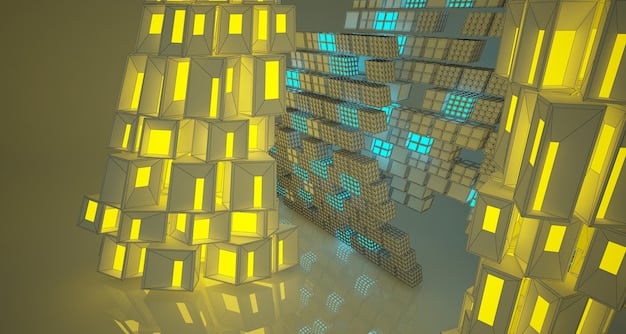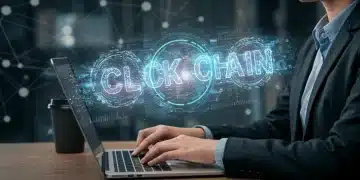Decentralized Fact-Checking: Blockchain’s Role in Combating US Misinformation

Decentralized fact-checking utilizes blockchain technology to combat misinformation in US news by creating a transparent and immutable record of verified facts, fostering trust and accountability in information dissemination.
In an era defined by information overload and the rapid spread of misinformation, the need for reliable fact-checking mechanisms is more critical than ever. Decentralized fact-checking, powered by blockchain technology, offers a promising solution to combat the pervasive issue of fake news in US news, providing a transparent and tamper-proof system for verifying information.
Understanding the Landscape of Misinformation in US News
The proliferation of misinformation in US news has become a significant concern, undermining public trust and potentially influencing democratic processes. Understanding the sources, the impact, and the limitations of current fact-checking methods is crucial context for the necessity of improved systems.
The Sources of Misinformation
Misinformation can stem from a variety of sources, including deliberate disinformation campaigns, clickbait journalism, and even unintentional errors. Social media platforms and partisan news outlets often amplify these inaccuracies, making it challenging for individuals to discern fact from fiction.
The Impact on Public Trust
The constant barrage of false or misleading information erodes trust in traditional media and institutions. This decline in trust can lead to political polarization, social division, and a general cynicism toward public discourse.

Current fact-checking methods, while valuable, often rely on centralized organizations, which can be perceived as biased or subject to manipulation themselves. These limitations highlight the need for a more transparent and decentralized system.
Current fact-checking methods are also often too slow to address rapidly spreading misinformation, especially in the age of social media. The reactive nature of these methods highlights the need for faster, more proactive solutions.
In conclusion, recognizing the pervasive nature of misinformation and the shortcomings of existing approaches sets the stage for exploring the potential of decentralized fact-checking as a remedy.
The Promise of Blockchain Technology in Fact-Checking
Blockchain technology offers a transformative approach to fact-checking, leveraging its decentralized and immutable nature to create a more reliable and transparent system. Its core features offer an alternative to traditional, centralized authorities.
Decentralization and Immutability
Blockchain’s decentralized structure ensures that no single entity controls the fact-checking process, reducing the risk of bias or manipulation. The immutability of the blockchain means that once a fact is verified and recorded, it cannot be altered, providing a permanent and auditable record.
Transparency and Traceability
Every transaction and data point on a blockchain is transparent and traceable, allowing users to verify the accuracy of information and trace its origins. This level of transparency can enhance trust in the fact-checking process and deter the spread of misinformation.
- Securing factual accuracy through distributed consensus mechanisms.
- Providing incentives for network participants to perform accurate fact-checking.
- Facilitating collaborative fact-checking efforts across diverse communities.
Blockchain technology offers a secure, transparent, and decentralized platform for verifying the accuracy of information, making it a valuable tool in the fight against misinformation.
The decentralized and immutable nature of blockchain makes it difficult for malicious actors to manipulate or censor information, increasing the resilience of the fact-checking system against attacks.
In short, Blockchain’s properties make it a perfect fit for building next-generation fact-checking platforms that can restore trust in news and media.
How Decentralized Fact-Checking Systems Work
Decentralized fact-checking systems operate by leveraging blockchain technology to create a network of participants who collaboratively verify information. The mechanisms behind these systems are complex but the intended output is simple: a single point of truth.
The Verification Process
When a claim is submitted for fact-checking, it is distributed to multiple participants in the network. These participants independently research and evaluate the claim, providing evidence and analysis to support their conclusions.
Consensus Mechanisms
The network employs consensus mechanisms, such as proof-of-stake or delegated proof-of-stake, to aggregate the findings of the participants and determine the veracity of the claim. This process ensures that the final verdict is based on the collective judgment of the network, rather than the opinion of a single individual or organization.

Incentive Models
To encourage participation and ensure accuracy, decentralized fact-checking systems often incorporate incentive models. Participants who provide accurate and reliable information are rewarded with tokens or other forms of compensation, while those who submit false or misleading information are penalized.
Reputation systems can also be used to track the accuracy and reliability of participants over time, further incentivizing them to provide high-quality fact-checking services.
Smart contracts can automate many of the processes involved in decentralized fact-checking, such as distributing claims, aggregating findings, and distributing rewards.
Put simply, Decentralized fact-checking systems combine technology and community input to build reliable, trustless sources of truth – and better public discourse, over time.
Examples of Blockchain-Based Fact-Checking Projects
Several projects are already exploring the potential of blockchain technology to revolutionize fact-checking. These range from startups to more established organizations, all exploring ways to decentralize truth online.
Factom
Factom offers a blockchain-based data integrity solution that can be used to verify the authenticity and accuracy of information. Factom’s technology could make it easier to track the provenance of information and detect tampering.
Civil
Civil aims to create a decentralized news ecosystem where journalists and readers can collaborate to ensure the accuracy and integrity of news reporting. It provides a platform for independent journalists to publish their work and engage with their audience in a transparent manner.
Metafact
Metafact is a platform that uses blockchain technology to reward experts for fact-checking and rating the accuracy of claims. The platform incentivizes experts to participate in the fact-checking process and provides a transparent record of their findings.
- Creating more transparent and accountable news ecosystems.
- Building trust in information through verifiable data provenance.
- Empowering individuals to participate in fact-checking and verification.
These projects demonstrate the potential of blockchain technology to transform fact-checking and create a more trustworthy information ecosystem.
These examples also highlight the diversity of approaches being taken to implement decentralized fact-checking, from data integrity solutions to community-driven news platforms.
In summary, these example projects are building real-world foundations for the future of credible online information.
Challenges and Limitations of Decentralized Fact-Checking
While decentralized fact-checking offers many advantages, it also faces several challenges and limitations. Scalability, incentive alignment, and the potential for manipulation are real concerns that need to be addressed.
Scalability Issues
Blockchain networks can be slow and expensive to operate, which can limit the scalability of decentralized fact-checking systems. As the volume of claims to be verified increases, the network may struggle to process them in a timely and cost-effective manner.
Incentive Alignment
Ensuring that participants are properly incentivized to provide accurate and unbiased fact-checking services is crucial for the success of decentralized fact-checking. If the incentives are not properly aligned, participants may be tempted to manipulate the system for their own benefit.
Potential for Manipulation
Despite the decentralized nature of blockchain technology, decentralized fact-checking systems are still vulnerable to manipulation. Malicious actors could create fake accounts, collude to promote false information, or launch denial-of-service attacks to disrupt the fact-checking process.
The complexity of blockchain technology can also be a barrier to adoption for both fact-checkers and consumers.
Moreover, the reliance on community input can lead to biases and echo chambers if the community is not diverse and representative.
To conclude, addressing these challenges is essential for realizing the full potential of decentralized fact-checking and ensuring its long-term viability.
The Future of Fact-Checking: A Decentralized Vision
Looking ahead, the future of fact-checking is likely to be increasingly decentralized. As blockchain technology matures and becomes more accessible, it will play a greater role in combating misinformation and promoting trust in information.
The Convergence of Technologies
Decentralized fact-checking systems may converge with other technologies, such as artificial intelligence and machine learning, to automate and enhance the fact-checking process. AI-powered tools could be used to identify potential misinformation, analyze evidence, and generate fact-checking reports, freeing up human fact-checkers to focus on more complex and nuanced cases.
The Rise of Decentralized News Ecosystems
Decentralized news ecosystems, built on blockchain technology, could empower independent journalists and news organizations to publish their work and engage with their audience in a transparent and accountable manner. These platforms could also incorporate decentralized fact-checking mechanisms, allowing readers to verify the accuracy of news reports and hold journalists accountable for their work.
- Building greater transparency and accountability in news and media.
- Empowering individuals to verify information and challenge falsehoods.
- Creating a more trustworthy and resilient information ecosystem.
Decentralized fact-checking has the potential to transform the way we consume and interact with information.
The widespread adoption of decentralized fact-checking could lead to a more informed and engaged citizenry.
In short, the future vision for fact-checking may be a world where verified information is available to all.
| Key Point | Brief Description |
|---|---|
| 💡 Blockchain | Decentralized ledger for secure and transparent data. |
| ✅ Fact-Checking | Verifying information to combat misinformation. |
| 🌐 Decentralization | Distributing control to reduce central manipulation. |
| 🛡️ Trust | Building confidence in news through verifiable truths. |
Frequently Asked Questions
▼
Decentralized fact-checking uses blockchain to verify news, removing central control. It ensures transparency, preventing misinformation by distributing verification across a network.
▼
Blockchain enhances fact-checking through its immutable ledger. Once data is verified, it can’t be altered, providing a reliable and transparent record of facts.
▼
Decentralization prevents any single entity from controlling the fact-checking process. This reduces bias and ensures a more objective evaluation of information.
▼
Challenges include scalability, ensuring proper incentives for participants, and preventing manipulation. Addressing these is crucial for the system’s success and long-term viability.
▼
The future involves integrating AI for automated analysis and decentralized news ecosystems enhancing transparency. The combined effect to empower people with verifiable information.
Conclusion
Decentralized fact-checking represents a paradigm shift in combating misinformation, offering a transparent, immutable, and community-driven approach to verifying information. While challenges remain, the potential for blockchain technology to foster a more trustworthy and resilient information ecosystem is undeniable. As these systems evolve, they pave the way for a future where verified facts prevail over falsehoods, empowering individuals to make informed decisions and strengthening the foundations of democratic discourse in the USA.





